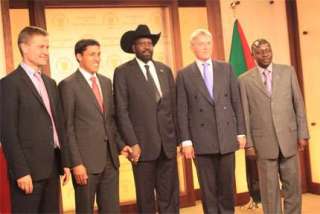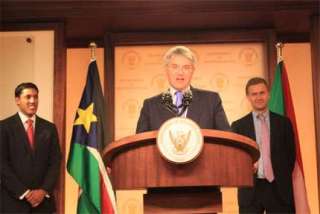Resolve Abyei crisis peacefully, Troika ministers tell Sudan’s ruling parties
JUBA 8, 2011 (JUBA) – The conflict in Sudan’s oil-producing region of Abyei should be peacefully resolved to avoid situations likely to drag the country back to war, development ministers from Norway, United Kingdom and the United States have advised.

Over the years, the US, Norway and the UK, better known as the Troika countries, have been credited for their longstanding humanitarian and development partnership with Sudan. They played key roles in brokering the 2005 Comprehensive Peace Agreement (CPA), which ended over two decades of war between north and south.
Specifically, the three ministers, in a joint statement urged the ruling parties of north and south Sudan to ensure that outstanding issues from the CPA like the conduct of a self determination in the Abyei border region and the demarcation of the north-south border are peacefully resolved before the July 9 declaration of South Sudan’s independence.
In principle, the trio fully committed themselves towards supporting the Thabo Mbeki-led AU High Level Implementation Panel on Sudan (AUHIP), but openly appealed to the parties involved in the negotiations to ensure that consensus is reached without delays.
On his part, the USAID administrator acknowledged South Sudan’s able leadership under Kiir, saying the US government will continue providing the necessary support that will benefit the soon-to-be-independent country. He cited capacity building needs, private sector development through agriculture and improving good governance and rule of law as some of the key areas that may require immediate intervention.
Meanwhile, a high level donor conference, according to Shah, is due to take place in September, during which participating nations – including South Sudan – will be required to present their respective country’s key priorities for funding.
Last month, a report released by the Enough Project described Abyei as “Sudan’s West Bank”, arguing that the escalating levels of violence in oil region threatens prospects for peace in the south, ahead of the region’s long-awaited independence.
According to the report authored Douglas H. Johnson, a member of the Abyei Boundaries Commission (ABC), the persistent violence in the region includes the “deliberate burning of villages by northern-aligned forces” and massive displacement of thousands of people. Such actions derails hopes for peace in the region the report said.

“Failure to implement the intent of the Abyei Protocol in both letter and spirit has implications for the uncompleted Popular Consultation processes in the sensitive border states of Blue Nile and South Kordofan,” the report says.
Abyei was due to hold a referendum in January to determine whether the country would join the south or remain on the north of the border. The South’s plebiscite on independence went ahead on schedule – with a massive vote for secession – while Abyei’s did not due to a dispute over who was allowed to vote.
In recent months, fighting in the Abyei area, involving Sudan Armed Forces (SAF) and allied militias allegedly linked to the Khartoum regime have reportedly displaced over 20,000 people. Officials from the south-ruling party have repeatedly blamed such incidences on the Khartoum regime’s “lack of commitment” to the full implementation of the 2005 CPA.
“These waves of instabilities in the south, especially in Abyei and other parts of the region clearly demonstrate Khartoum’s willingness to continue limited warfare against the southern government and its army,” Pagan Amum, secretary general of the Sudan People’s Liberation Movement (SPLM) recently told journalists.
But to ensure full implementation of the Abyei referendum and other outstanding CPA issues, he openly appealed to the U.S. government to affirm its commitment towards finding an ideal solution to the problems in the disputed oil-producing region.
Last week new clashes erupted in the contested region between the north Sudan forces in the JIUs and local police from southern Sudan. The fight resulted in the death of 14 soldiers from both sides and both sides accusing the other of starting the violence.
In the last few days both the UN and African Union have called on the north and south to resolve the impasse over Abyei. Failure to do so, analyst say, could result in a return to conflict.
(ST)

onlysonmabi
Resolve Abyei crisis peacefully, Troika ministers tell Sudan’s ruling parties
Thanks to the International communities for the goods step they are doing for the Abyei problem to me it is good for Abyei to be control by Contigent Force becaues Arab put the Abyei to be the key of going back to the war.
Cibaipiath Junub Sudan
Resolve Abyei crisis peacefully, Troika ministers tell Sudan’s ruling parties
Bashir does not want to resolve Abyei Crisis peacefully. There is no peaceful agreement that was left apart from the two Internationally recognised chapters (CPA and PCA). Unless, you international Community and AUHPL want to divide the area of 9 Dinka Ngok Chiefdom with South and North. If that is not the case, then there is no need for NCP and Bashir to stick on Abyei on false claims.
Paul Ongee
Resolve Abyei crisis peacefully, Troika ministers tell Sudan’s ruling parties
Cibaipiath Junub Sudan,
Your comment hit the point that “There is no peaceful agreement that was left apart from the two internationally recognized chapters (CPA and PCA)”. You’re right brother, you know what; peaceful agreements have been agreed upon over and over to form commissions and security committees to be implemented peacefully on the ground but Khartoum keeps dragging its feet as usual. Are we not only left with “war agreement” instead of peaceful ones?
We’re left only with one option; commitment to ‘un-agreed war agreement” to resolve the issue of Abyei peacefully. I think we’re left with nothing except formation of “war commission” to find a peaceful solution to Abyei’s issue. The message to Khartoum is clear, Abyei cannot be divided and it’s not neither a “shared area” nor Sudan’s West Bank. War commission is not formed because Khartoum wants us to lose focus on preparation for our long-awaited freedom and independence of South Sudan.
Khartoum got, celebrated and protected its independence peacefully before and after January 1st, 1956 but it’s now our turn to celebrate and protect it at any cost without any provocative distraction before or after July 9, 2011. After peaceful celebration, things will dramatically change and begin taking care of themselves the way Khartoum desperately wants them resolved. It will be a good time for it to regret creating an ugly war situation.
The 21-year old war between North-South wasn’t enough and the ongoing 7-year old war between Darfur and Khartoum is not even enough to realize peace. Therefore, the after-July 9 war will certainly be enough for Khartoum to either realize peace or maintain its aggressive proxy war against South Sudan through southern militia generals and Messeriya. That will be the time Khartoum will have a choice to make. Unfortunately, the NCP leadership already got widening cracks on its Islamic conservative view.
Paul Ongee
Khartoum Watch
Justin Chicago opiny
Resolve Abyei crisis peacefully, Troika ministers tell Sudan’s ruling parties
The problem of Abyei is to be resolved peacefully and was put on the table very clearly by CPA and PCA.It is very unfortunate that the British made all these mess. It was done in many African countries south of the Sahara and when these countries became independent there was alot of dispute on the border issue that is why this artificial border divided people across the border for example the Acholi are found in Sudan and Uganda,Kakwa in Sudan,DDR or Congo Kinshasa and uganda and the list goes on.
The question I always ask myself is do the Dinka Ngok not look at themselves as notherners before and after 1956 when sudan gained her Independence?.
Did it occur at one time in point that the Dinka Ngok asked to be relocated to the South after 1956?.The International court of Arbtration came up with a clear solution why not impliment the act and draw the border accordingly. If the Dinka Ngok falls in the South or north or a portion let be it. What matters is the border line in 1956 and not what took place in 1905.The international community especially the Troika have stood with us in time of war and peace and I know many of them went through the same thing in many European countries
we can learn from their history and experience as the WWI and WWW II changed the borders drastically especially for example the german border.It is time we learn to solve problems peacefully we fought for over 50 years and it was only through peaceful means that has brought us to this level. There is always room for peaceful means and ways to solve problems and there is always the will and that should be the norm.
Adam
Resolve Abyei crisis peacefully, Troika ministers tell Sudan’s ruling parties
Thank you Mr. Justin Chicago Opiny. Your comment is positive and logical.
I am proud of you. This is the spirit that brings peace and development. I hope many Southerners will follow your way. No need to be nervous at all.
Adam Milawaki – Mayendit
Southern Sudan